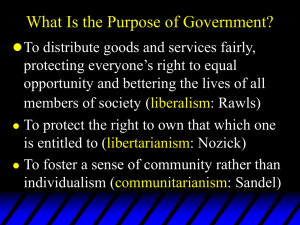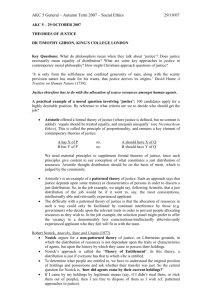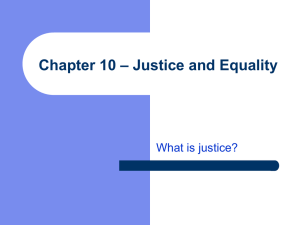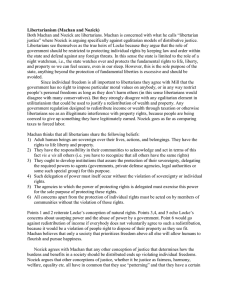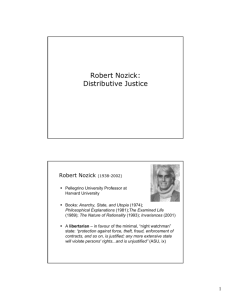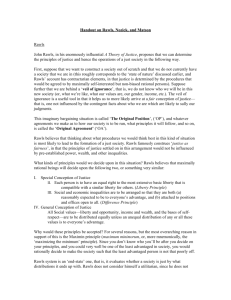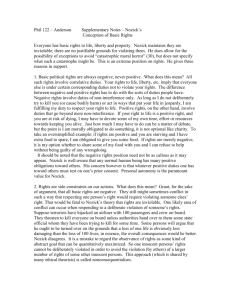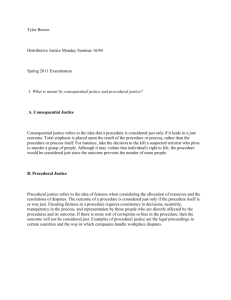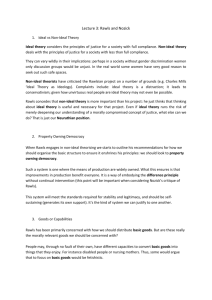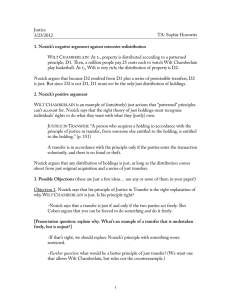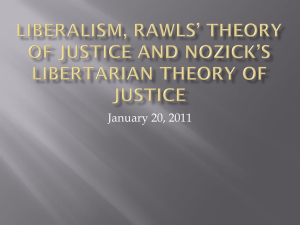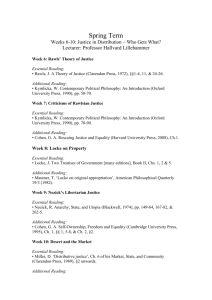Distributive Justice - John Rawls v. Robert Nozick
advertisement
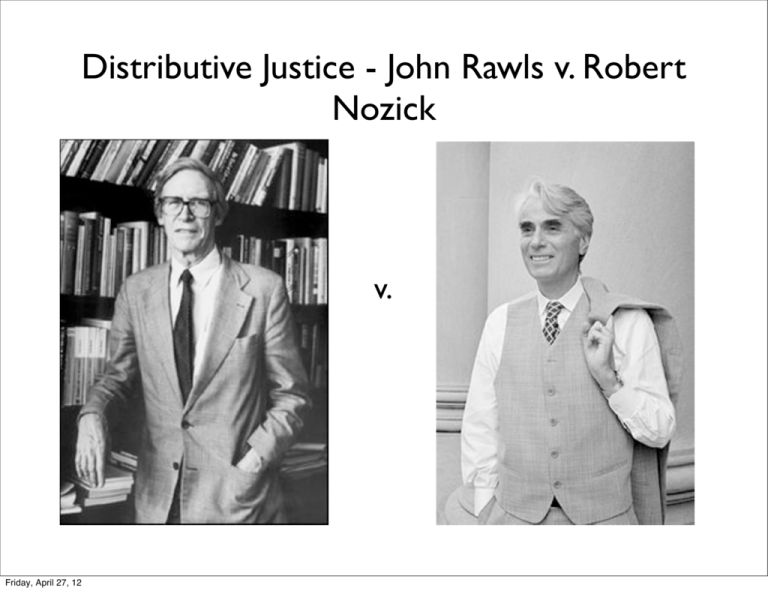
Distributive Justice - John Rawls v. Robert Nozick v. Friday, April 27, 12 The basic questions of distributive justice: • How should resources be distributed amongst the human population? • What are the principles that define a just distribution? There are two principle ways of looking at these questions: Friday, April 27, 12 1. End state theories • Measure the justice behind a given distribution by examining conditions at a given slice of time. • For example, if an end state theorist were to ask whether resources in contemporary American society were justly distributed, they would look at the distribution of resources in America today. • John Rawls is an end state theorist Friday, April 27, 12 2. Process based theories • Measure the justice behind a given distribution by examining the process that led to that distribution • For example, if an process theorist were to ask whether resources in contemporary American society were justly distributed, they would look at the process by which that distribution was arrived at. • Process theoriest maintain that if the process is just that the outcomes of that process are also just • Robert Nozick was a process based theorist Friday, April 27, 12 3. Rawls Theory of Justice • Principles of justice are arrived at using the original position/veil of ignorance thought experiment • From this, two principles of Justice emerge: 1. The principle of liberty: Each person is to have an equal right to the most extensive basic liberty compatible with a similar liberty for others. 2. The principle of economic distribution: Social and economic inequalities are to be arranged so that they are both reasonably expected to be to everyone’s advantage and attached to positions and offices open to all. The first of these always has priority over the second. Friday, April 27, 12 4. Nozick’s Libertarianism Nozick Argued that an economic distribution is just if if everyone is entitled to their holdings (property, resources, and wealth under one’s control). The following three principles he claims exhaustively define justice of holdings (2-3 from your reading): 1. “A person who acquires a holding in accordance with the principle of justice in acquisition is entitled to that holding.” 2. “A person who acquires a holding in accordance with the principle of justice in transfer, from someone else entitled to that holding, is entitled to the holding.” 3. No one is entitled to a holding except by (repeated) application of 1 and 2. Unjust holdings are remedied by the principle of rectification which maintains that the status quo should be returned to the best estimate of what the situation would be had the injustice not taken place. Based on Nozick’s theory the state should be minimized (it main duties are protection from external enemies and upholding the principle of rectification.) Taxation, given that it violates the principles outlined above, is the equivalent to slavery. Friday, April 27, 12 Nozick’s Wilt Chamberlain Thought Experiment (paragraph 5 on your document) The purpose of this thought experiment is to demonstrate the inherent problems with end state theories. Suppose the perfect distribution of wealth (perhaps that described by Rawls from A Theory of Justice. Call this distribution D. Now suppose that 1 million people voluntarily give $.25 each to watch Wilt Chamberlain play Basketball. At the end of the season, Chamberlain has $250,000 more than he had before. Call this new distribution of wealth D2 . Is this new distribution unjust? If so, why? Based on Nozick’s theory of entitlement, the new distribution is perfectly just because the fans voluntarily transfered their money to Chamberlain Friday, April 27, 12 This illustrates what Nozick sees as one of the central problems of any end state theory that to maintain the “perfect” state requires either (paragraph 6): 1. Constant government interference to prevent people from transferring holdings as they wish,or, 2. Constant government interference to take resources from some and give it to others Both of these situations violate Nozick’s theory of entitlements and both lead to the creation of a powerful potentially abusive government. Problems with Nozick’s theory Friday, April 27, 12 • It instrumentalists everything (there is no value except instrumental value) and thus denies the existence of value that is intrinsic • Thus happiness and suffering (or its avoidance) are stripped away from calculations of justice • For example, If society had enough resources to feed and house all people if the distribution of those resources were maintained at D by taxation and regulation, but not enough to feed and house all people if the distribution were determined by the rules of entitlement alone, making sure all people were fed and housed would constitute an injustice. 5. Wealth distribution in the United States today Does Rawls or Nozick offer a better framework for moving forward? Friday, April 27, 12 Questions for discussion of Rawls and Nozick • For each philosopher, describe the likely role of government in establishing and maintaining a just society? • Which of the two thinkers do you believe has the right ideas regarding what constitutes "the just society"? Explain your reasons. • Which thinkers' ideas are most reflected by modern American society? Explain Friday, April 27, 12
